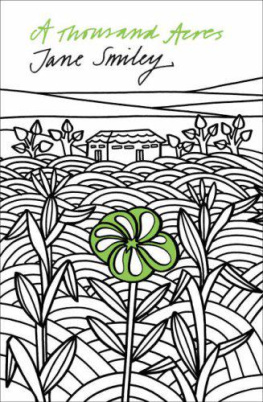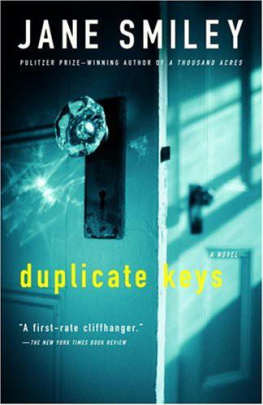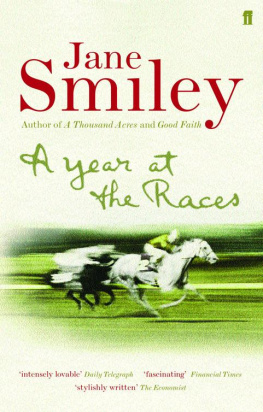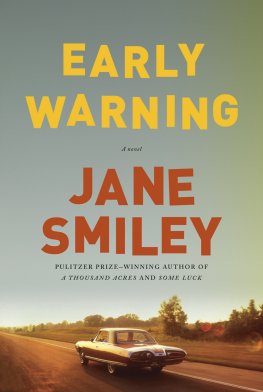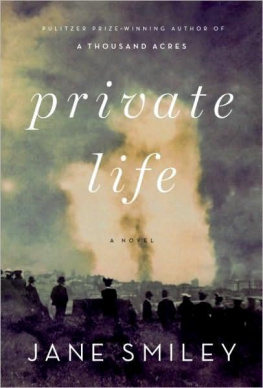Jane Smiley - A Thousand Acres
Here you can read online Jane Smiley - A Thousand Acres full text of the book (entire story) in english for free. Download pdf and epub, get meaning, cover and reviews about this ebook. year: 1992, publisher: Fawcett, genre: Art. Description of the work, (preface) as well as reviews are available. Best literature library LitArk.com created for fans of good reading and offers a wide selection of genres:
Romance novel
Science fiction
Adventure
Detective
Science
History
Home and family
Prose
Art
Politics
Computer
Non-fiction
Religion
Business
Children
Humor
Choose a favorite category and find really read worthwhile books. Enjoy immersion in the world of imagination, feel the emotions of the characters or learn something new for yourself, make an fascinating discovery.
- Book:A Thousand Acres
- Author:
- Publisher:Fawcett
- Genre:
- Year:1992
- Rating:4 / 5
- Favourites:Add to favourites
- Your mark:
- 80
- 1
- 2
- 3
- 4
- 5
A Thousand Acres: summary, description and annotation
We offer to read an annotation, description, summary or preface (depends on what the author of the book "A Thousand Acres" wrote himself). If you haven't found the necessary information about the book — write in the comments, we will try to find it.
A Thousand Acres — read online for free the complete book (whole text) full work
Below is the text of the book, divided by pages. System saving the place of the last page read, allows you to conveniently read the book "A Thousand Acres" online for free, without having to search again every time where you left off. Put a bookmark, and you can go to the page where you finished reading at any time.
Font size:
Interval:
Bookmark:
A Thousand Acres
by
Jane Smiley
ballanti edition (November 1992)
Fawcett Books; ASIN: 0449907481
The body repeats the landscape. They are the source of each other and create each other. We were marked by the seasonal body of earth, by the terrible migrations of people, by the swift turn of a century, verging on change never before experienced on this greening planet.
MERIDEL LE SUEUR, "The Ancient People and the Newly Come" AT SIXTY MILES PER HOUR, you could pass our farm in a minute, on County Road 686, which ran due north into the T intersection at Cabot Street Road.
Cabot Street Road was really just another country blacktop, except that five miles west it ran into and out of the town of Cabot. On the western edge of Cabot, it became Zebulon County Scenic Highway, and ran for three miles along the curve of the Zebulon River, before the river turned south and the Scenic continued west into Pike. The T intersection of CR 686 perched on a little rise, a rise nearly as imperceptible as the bump in the center of an inexpensive plate.
From that bump, the earth was unquestionably flat, the sky unquestionably domed, and it seemed to me when I was a child in school, learning about Columbus, that in spite of what my teacher said, ancient cultures might have been onto something. No globe or map fully convinced me that Zebulon County was not the center of the universe.
Certainly, Zebulon County, where the earth was flat, was one spot where a sphere (a seed, a rubber ball, a ballbearing) must come to perfect rest and once at rest must send a taproot downward into the ten-foot-thick topsoil.
Because the intersection was on this tiny rise, you could see our buildings, a mile distant, at the southern edge of the farm. A mile to the east, you could see three silos that marked the northeastern corner, and if you raked your gaze from the silos to the house and barn, then back again, you would take in the immensity of the piece
A THOUSAND ACRES of land my father owned, six hundred forty acres, a whole section, paid for, no encumbrances, as flat and fertile, black, friable, and exposed as any piece of land on the face of the earth.
If you looked west from the intersection, you saw no sign of anything remotely scenic in the distance. That was because the Zebulon River had cut down through topsoil and limestone, and made its pretty course a valley below the level of the surrounding farmlands. Nor, except at night, did you see any sign of Cabot. You saw only this, two sets of farm buildings surrounded by fields. In the nearer set lived the Ericsons, who had daughters the ages of my sister Rose and myself, and in the farther set lived the Clarks, whose sons, Loren and Jess, were in grammar school when we were in junior high. Harold Clark was my father's best friend. He had five hundred acres and no mortgage. The Ericsons had three hundred seventy acres and a mortgage.
Acreage and financing were facts as basic as name and gender in Zebulon County. Harold Clark and my father used to argue at our kitchen table about who should get the Ericson land when they finally lost their mortgage. I was aware of this whenever I played with Ruthie Ericson, whenever my mother, my sister Rose, and I went over to help can garden produce, whenever Mrs. Ericson brought over some pies or doughnuts, whenever my father loaned Mr. Ericson a tool, whenever we ate Sunday dinner in the Ericsons' kitchen.
I recognized the justice of Harold Clark's opinion that the Ericson land was on his side of the road, but even so, I thought it should be us. For one thing, Dinah Ericson's bedroom had a window seat in the closet that I coveted. For another, I thought it appropriate and desirable that the great circle of the flat earth spreading out from the T intersection of County Road 686 and Cabot Street Road be ours.
A thousand acres. It was that simple.
It was 1951 and I was eight when I saw the farm and the future in this way. That was the year my father bought his first car, a Buick sedan with prickly gray velvet seats, so rounded and slick that it was easy to slide off the backseat into the footwell when we went over a stiff bump or around a sharp corner. That was also the year my sister Caroline was born, which was undoubtedly the reason my father bought the car. The Ericson children and the Clark children continued to ride in the back of the farm pickup, but the Cook children kicked their toes against a front seat and stared out the back windows, nicely protected from the dust. The car was the exact measure of six hundred forty acres compared to three hundred or five hundred.
In spite of the price of gasoline, we took a lot of rides that year, something farmers rarely do, and my father never again did after Caroline was born. For me, it was a pleasure like a secret hoard of coins-Rose, whom I adored, sitting against me in the hot musty velvet luxury of the car's interior, the click of the gravel on its undercarriage, the sensation of the car swimming in the rutted road, the farms passing every minute, reduced from vastness to insignificance by our speed; the unaccustomed sense of leisure; most important, though, the reassuring note of my father's and mother's voices commenting on what they saw-he on the progress of the yearly work and the condition of the animals in the pastures, she on the look and size of the house and garden, the colors of the buildings.
Their tones of voice were unhurried and selfconfident, complacent with the knowledge that the work at our place was farther along, the buildings at our place more imposing and better cared for. When I think of them now, I think how they had probably seen nearly as little of the world as I had by that time. But when I listened to their duet then, I nestled into the certainty of the way, through the repeated comparisons, our farm and our lives seemed secure and good.
JEss CLARK WAS GONE for thirteen years. He left for a commonplace reason-he was drafted-but within a few months of Harold's accompanying his son to the bus depot in Zebulon Center, Jess and everything about him slipped into the category of the unmentionable, and no one spoke of him again until the spring of 1979, when I ran into lLoren Clark at the Thank in Pike and he said that Harold was giving a pig roast for Jess's homecoming, would all of us come, no need to bring anything. I put my hand on Loren's arm, which stopped him from turning away and made him look me in the eye. I said, "Well, then, where's he been?"
"I guess we'll find out."
"I thought he hadn't been in touch."
"He wasn't, till Saturday night."
"That's all?"
"That's all." He gave me a long look and a slow smile, then said, "I notice he waited till we busted our butts finishing up planting before staging this resurrection."
It was true that butts had been busted, since the spring had been cold and wet, and no one had been able to get into the fields until mid-May.
Then almost all the corn in the county had been planted in less than two weeks. Loren smiled. Whatever he said, I knew he was feeling a little heroic, just as the men around our place were feeling. I thought of something. "Does he know about your mom?"
"Dad told him."
"Is he bringing any family?"
"No wife, no kids. No plans to go back to wherever he is, either.
We'll see." Loren Clark was a big, sweet guy. When he spoke about Jess, it was in easy, almost amused tones, the same way he spoke about everything. Seeing him somewhere was always a pleasure, like taking a drink of water. Harold put on a terrific pig roast-while the pig was roasting, he would syringe lime juice and paprika under the skin. Even so, I was surprised Harold intended to take a day off from bean planting. Loren shrugged. "There's time," he said. "The weather's holding now. You know Harold. He always likes to go against the grain."
Font size:
Interval:
Bookmark:
Similar books «A Thousand Acres»
Look at similar books to A Thousand Acres. We have selected literature similar in name and meaning in the hope of providing readers with more options to find new, interesting, not yet read works.
Discussion, reviews of the book A Thousand Acres and just readers' own opinions. Leave your comments, write what you think about the work, its meaning or the main characters. Specify what exactly you liked and what you didn't like, and why you think so.

